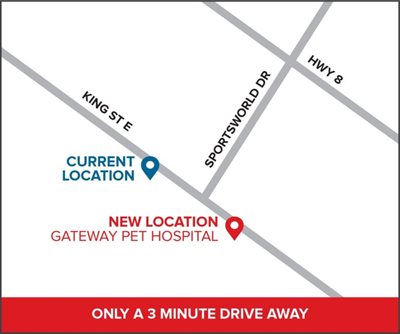Dear Valued Clients,
After many wonderful years, Pioneer Pet Hospital closed its doors on April 17, 2025. We are deeply grateful for your trust and support and have cherished every moment caring for your beloved pets.
To ensure a smooth transition, Gateway Pet Hospital (just 3 minutes away) will be your new veterinary home, where some of our team members will continue to provide the compassionate care, your pets deserve.
What You Need to Know:
✔ Medical Records – Automatically transferred to Gateway.
✔ Medications & Food Orders – Please contact Gateway to place your orders.
✔ Appointments – Schedule any upcoming veterinary visits with the Gateway team.
About Gateway Pet Hospital
Gateway Pet Hospital has been proudly serving the South Kitchener community since 2011. As a full-service veterinary clinic, Gateway provides a wide range of medical, diagnostic, surgical, and preventive health services for dogs and cats. Their dedicated team prioritizes the human-animal bond and works closely with pet owners to deliver high-quality, compassionate care.
⭐ 4.8-star rating on Google Reviews
Services at Gateway Pet Hospital
✅ Full-Service Animal Hospital – Wellness exams, vaccinations, dental care, surgeries, radiography, bloodwork, and more.
✅ Puppy & Kitten “Healthy Start” Program – A bundle of essential vet visits at a reduced rate, ask our vet team for more details
✅ Grooming Services – Full dog grooming available by appointment.
✅ Online Shopping & Prescription Refills – Convenient ordering from home.
✅ Mobile App – Access your pet’s records, request refills, and more.
Gateway Pet Hospital – Your New Veterinary Home
🕘 Monday – Friday: 8:00 AM – 7:00 PM
🕘 Saturday: 9:00 AM – 4:00 PM
🕘 Sunday: 9:00 AM – 1:00 PM
Address: 4391 King Street East, Kitchener, ON (Just 3 minutes away)
Phone: (519) 653-1003
Email: info@gatewaypethospital.com
🌐 gatewaypethospital.com

💙 Thank you for allowing us to be part of your pet’s journey. We will always cherish the memories we’ve made together! 🐾